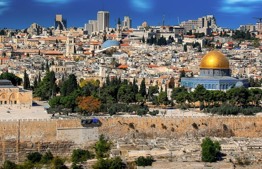Parashat Reeh: The Importance of the Journey

Why did the Vilna Gaon decline divine insights, and what does this have to do with ma'aser sheni? On the Gra, ma'aser sheni, and the importance of the journey. Also: on Geva leeks and the righteous convert Baruch Mizrachi.
;וְכִי יִרְבֶּה מִמְּךָ הַדֶּרֶךְ כִּי לֹא תוּכַל שְׂאֵתוֹ כִּי יִרְחַק מִמְּךָ הַמָּקוֹם אֲשֶׁר יִבְחַר ה' אֱלֹקיךָ לָשׂוּם שְׁמוֹ שָׁם כִּי יְבָרֶכְךָ ה' אֱלֹקיךָ
וְנָתַתָּה בַּכָּסֶף וְצַרְתָּ הַכֶּסֶף בְּיָדְךָ וְהָלַכְתָּ אֶל הַמָּקוֹם אֲשֶׁר יִבְחַר ה' אֱלֹקיךָ בּוֹ
Should the distance be too great for you, should you be unable to transport them, because the place where Hashem your G-d has chosen to establish His name is far from you and because Hashem your G-d has blessed you, you may convert them into money. Wrap up the money in your hand and take it with you to the place that the Hashem your G-d has chosen. (Devarim 14:24-25)
The Vilna Gaon and the Maggid
Who wouldn't want divine revelations that can effortlessly bring you to lofty spiritual heights? At least one such individual did exist: Rabbi Eliyahu, the Vilna Gaon, known also as the Gra. Besides his mindboggling greatness in Talmud and halacha, he was also one of the greatest kabbalists who ever lived. A person who wanted to draw close to Hashem with all of his gifts and talents (and he was blessed with quite a few of these), the Gra strove to achieve lofty insights also of the secrets of the Torah. At this point, he is given a million-dollar opportunity: a maggid angel is sent from the heaven to reveal Torah secrets to him. It's hard to know if angels can be surprised, but if so, this one would most certainly was when the Gra declined the maggid's offer. The Gra preferred achieving these insights through his own efforts, without any shortcuts.
It seems that behind the Gra's refusal is the understanding that Hashem is not interested in deep spiritual knowledge in and of itself. There is no shortage of angels in heaven. Hashem created people so that we will serve Him and reveal His name and sanctity in this world, with all the problems and difficulties involved. It is the effort, the work that Hashem desires, and not only the results. If today results are the be-all and end-all for most people, for Hashem, the journey along the way is the determining factor.
Lofty involvement with money
Our parasha features an excellent example of the importance of the journey in the verses that discuss ma'aser sheni. After giving teruma to the Kohen and ma'aser rishon to the Levi, during years 1,2,4, and 5 of the shemita cycle, ma'aser sheni is to be set aside (in years 3 and 6 one gives ma'aser ani to a poor person).
The ma'aser sheni is given to … yourself. People are supposed to go up to Jerusalem with the fruits of ma'aser sheni and eat them there in a state of ritual purity, in order to draw close to Hashem. But what happens if you live far from Jerusalem, and it is difficult to bring so many fruits there? Besides, in Temple times, who said that the fruit would survive all the way to Jerusalem?
In such cases, the Torah allows us to transfer the sanctity of the ma'aser fruit onto a money, and bring the money with us to Jerusalem. This money is used to purchase food and drink to be consumed in Jerusalem in a state of purity. The way the Torah tells us about this mitzvah is very interesting:
" וְכִי יִרְבֶּה מִמְּךָ הַדֶּרֶךְ … וְנָתַתָּה בַּכָּסֶף וְצַרְתָּ הַכֶּסֶף בְּיָדְךָ וְהָלַכְתָּ אֶל הַמָּקוֹם אֲשֶׁר יִבְחַר ה' אֱלֹקיךָ בּוֹ"
" Should the distance be too great for you … Wrap up the money in your hand and take it with you to the place that the Hashem your G-d has chosen."
The Torah gives us precise guidelines of what do to: we have to transfer the sanctity onto money, take the money in our hand, and go up to Jerusalem. Is there really a need for all of this description? Is there significance in the words "vetzarta hakesef beyadecha"? If someone puts the money in someone else's hands, does it make a difference? This phrase seems superfluous.
Chazal noticed this issue, and extrapolate from the verse that the word tzarta is not in the sense of a tzeror (bundle) of money in one's hand, but rather the word tzura, form. This teaches us that one may not transfer sanctity onto an asimon, that is, a piece of cut silver, but rather a minted silver coin (asimon is from the word a-simun, that is, without a mark). This interpretation is homiletic, however, and the text always has a peshat meaning as well.
On the simple, peshat level, It seems that the Torah wanted to convey the importance of the journey. The significance of the mitzvah is not only the final result—actually eating the fruit or whatever we buy with the money in Jerusalem—but rather what happens along the way. Even taking the bundle of money in one's hand is part of the mitzvah. We can learn so much from these few words. People glorify money, dedicate their entire lives to accumulate it, and don't even leave time for themselves to enjoy it. And here the Torah comes and describes how to ascend to G-d's city, and use to use the money—the same money that so many blindly pursue—in order to become sanctified, to draw closer to Hashem. One can get so much not only out of the mitzvah that one performs, but even from every step of the journey.
The journey and the Land of Israel
The Land of Israel is a place not only of results, but primarily of the journey leading to them. It is a mitzvah to work its soil (according to the Hatam Sofer), and the world of agriculture has a very prominent role, with every step of growth having an impact on the quality of the end product. In light of this, it is not surprising that it was no one other than the Gra who turned down the option of taking spiritual shortcuts to spiritual growth was the first who encouraged his disciples to make Aliya, with the set purpose of bringing the redemption in a natural way. This concept was preserved by the tradition of the Prushim of the Yishuv, established by the disciples of the Gra in Jerusalem, also indicated in the studies of Dr. Aryeh Morgenstern on the topic. When we see the excitement of the Gra and his disciples from every baby step in the redemption process, we can see how the journey is important, and not only the final result.
Leeks from Geva
"ר' יוסי אומר: לא הוזכרו רימוני בדאן וחצירי גבע אלא שיהיו מתעשרין ודאי בכל מקום"
"Rabbi Yose said: Badan pomegranates and Geva leeks were only mentioned because they need to be tithed with certainty in every case" (Mishna Kelim 17:5).
The pomegranates from Bandan, a Kuti settlement where residents would not tithe produce, certainly required tithing (as tevel vaday, not as demay). The same holds true for leeks, biblically known as chatzir, which came from the Kuti settlement of Geva.
Many settlements in the Land of Israel with high latitude were called Geva. The Geva described by the Mishna here, it seems, is identified with Kafr Jaba in North Samaria, near the beginning of the Sa-Nur Valley. Geva is mentioned in Samarian shards from the period of the Israelite kingdom. During the Second Temple and the Talmudic period the settlement was inhabited by Kutim.
An outstanding personality identified with Geva in modern times was the righteous convert Baruch Mizrachi. Mizrachi was born in Zefat as a Muslim Arab, but was fascinated by the Jews of his city, and became close with local Betar activists. At a young age he converted and became a full-fledged Jew. He joined Etzel, was later caught by the British, and exiled to Eritrea. Although it was prohibited to take any personal possessions with him, he insisted on taking his tallit and tefilin.
Upon Mizrachi's return to pre-State Israel, he continued his activities in Etzel, and joined an outpost called Margolin, adjacent to Beit Lid. During the War of Independence, he was sent by Etzel's Arab Division to gather intelligence near Jenin. An Arab policeman from the Beit Lid police recognized him based on his golden tooth, and Mizrachi was executed by al-Qawuqji's Arab Liberation Army.
Mizrachi's plight was only known after the Six Day War, when Jaba residents were interrogated. His remains were transferred in a full military ceremony to the Netanya Military Cemetery. His gravestone cites his parents' names: Avraham Avinu and Sara Imeinu.




